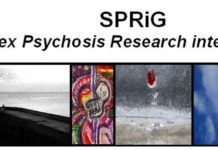Study Finds First-Episode Psychosis Patients Fare Better with Vitamin D
Researchers examine the relationship between vitamin D and clinical and cognitive symptoms in first-episode psychosis.
Psychosis Diagnosis Linked With Lower Rates of Exercise
A new study finds that for those experiencing symptoms associated with psychosis, a low-level of physical activity is associated with receiving a diagnosis of a psychotic disorder.
Meta-Analysis Finds Asking About Suicidal Thoughts Does Not Predict Suicide
A recent meta-analysis finds that the association between reported suicidal ideation and later suicide is low.
New Study Examines Successful Discontinuation of Antipsychotics
A new study to be published in the next issue of Schizophrenia Research examines patients suffering from a first-episode of psychosis who stop taking any antipsychotic drugs. The researchers attempt to identify variables that can serve as predictors of the successful discontinuation of antipsychotics. They find, for example, that those who discontinue the drugs have, on average, the same outcomes as those who stay on them, and that those who have better social integration are more likely to discontinue without relapse.
Social Recovery Therapy for First Episode Psychosis
Social Recovery Therapy shows promising results for individuals who experience first-episode psychosis.
Leading Researchers Critique Current Paradigm for Studying ‘Schizophrenia’ Risk
Re-conceptualizing the Clinical-High-Risk/Ultra-High-Risk Paradigm: A critique and reappraisal
Are Depression Guidelines Missing the Evidence for Exercise?
A recent review suggests that depression guidelines do not incorporate evidence for exercise within a stepped-care approach and may be over-reliant on pharmacological treatments.
Counter-Messaging Downplays Effectiveness of Exercise for Depression
Counter-messaging and a lack of critical analysis may lead doctors away from suggesting exercise for depression.
Study Suggests Mania More Common in Psychosis When Antidepressants Used
A prospective cohort study of those labeled high risk for psychosis finds a higher prevalence of antidepressant use among those who develop manic symptoms.
More Physical Activity-Based Mental Health Interventions Needed in Schools
What physical activity-based programs are being implemented in schools, how are they being researched, and what kind of impact have they made?
Study Explores Impact of Urban vs. Rural Upbringing on Stress Response
A new study investigates the relationships between early-home environmental factors and later-life physiological response to psychosocial stressors.
Social Adversity and Crime Victimization Increase Risk of Psychotic Experiences Five Fold
Researchers parse out factors within urbanicity that leads to risk for psychotic experiences.
Police Violence Victims at Increased Risk of Psychotic Symptoms
Researchers examine links between police victimization and psychotic symptoms in a topical new study.
Large German Anti-Stigma Campaign Shows Little Effect on Attitudes
“Overall, this study showed that the information and awareness campaign had almost no significant effects on the general public's attitudes toward people affected by either schizophrenia or depression,” the researchers, led by German medical sociologist Anna Makowski, wrote. “One could assume that deeply rooted convictions cannot be modified by rather time-limited and general activities targeted at the public.”
Early Attention to Life Circumstances and Relationships Improves Outcomes for Psychosis
Coordinated care with employment support and family therapy leads to superior outcomes for those diagnosed with psychotic disorders.
Researchers Probe Connections Between Physical Activity and ‘Severe Mental Illness’
How does physical activity affect people diagnosed with bipolar, schizophrenia and major depressive disorders?
More Evidence That Physical Activity Prevents Depression
Higher levels of physical activity serve as a protective factor for the future development of depression.
Study Challenges Assumption that Schizophrenia Impairs Cognitive Ability
Secondary factors may impair performance on cognitive tasks, making it difficult for individuals diagnosed with schizophrenia to perform to the best of their ability.
Perfectionism May Lead to Significant Psychological Distress, Study Suggests
A new study suggests needing to appear perfect to others leads to mental health stigma and a higher risk of untreated psychological distress.
First Systematic Review of Leading School-Based Mental Health Programs
Results reflect moderate to strong evidence in support of the non-pharmacological school-based interventions reviewed in the study.
Minority and Immigration Status Associated with Psychosis Risk
Ethnic minorities and those who migrated during childhood have an elevated risk for psychosis, study finds.
Study Investigates Long-Term Effects of Social and Emotional Learning Programs
Social and Emotional Learning (SEL) programs have gained popularity in U.S. schools in recent years. A new study examines the nature and longevity of their impact on students.
We Need to Talk About Frankie
In this piece for The Cut, Dyan Neary details the story of Frankie Perry, a man whose life was forever altered by being prescribed an...
Researchers Test Harms and Benefits of Long Term Antipsychotic Use
Researchers from the City College of New York and Columbia University published a study this month testing the hypothesis that people diagnosed with schizophrenia treated long-term with antipsychotic drugs have worse outcomes than patients with no exposure to these drugs. They concluded that there is not a sufficient evidence base for the standard practice of long-term use of antipsychotic medications.
International Study Examines Environmental Factors Associated with Psychosis
Study finds the incidence of “psychosis” to vary by person and place, corresponding to factors such as race, ethnicity, age, and environment.
































